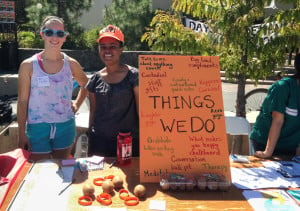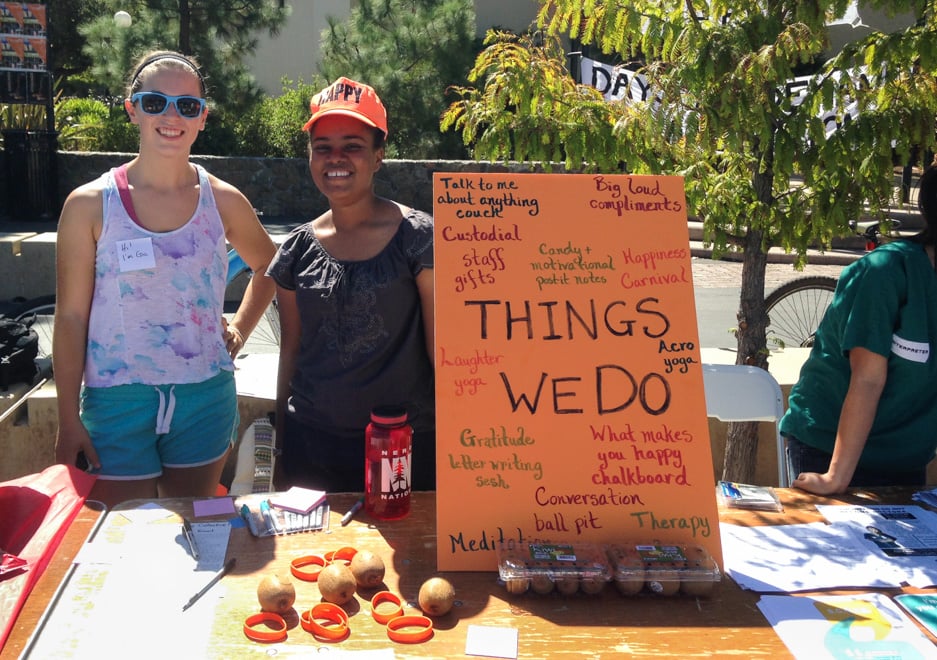
Thursday nights at the Education building are usually shrouded deep in the sounds of furious scribbling and whizzing bikes, save for a mysterious noise this past Thursday: the Happiness Collective, cracking cucumbers.
“There’s always a vegetable of the week plus snacks, and the philosophy is to take two of something: One for ourselves and one for someone else,” said Sean Volavong ’19, a recent and peppy recruit. He and his fellow club members meet once a week for an hour of icebreakers, event-planning and happiness activities such as cucumber-breaking and meditation.
They’re fun but hardly frivolous.
In the words of Happiness Collective President Eleanor Collier ’17, “The long-term reason for the Happiness Collective is to take specific steps to address the issue of happiness at Stanford at a cultural level.”
They do this by planning random acts of kindness for peers and happy-making club meetings that are open to anybody.
“I could talk for hours about happiness at Stanford,” Collier said, reading from a post-it manifesto with concrete suggestions that range from a wellness room on campus for students to a different vocabulary of success. “There needs to be radical and specific change. Professors always say casually, ‘You all are some of the smartest students, the most talented in the country’, and I know they mean well. But it sends messages that make people worry, ‘What if I get a D in that class? Am I not smart or worthy anymore?’”
Collier is only the second President of the three-year-old club, which grew out of an attempt by Vaden’s wellbeing center “iThrive @ Stanford” to start a student-led group. Impeded by regulations against linking student groups to administrations, the Happiness Collective was eventually founded as an independent student club by Jacob Dalder ’15.
In its three-year history, the Happiness Collective has thrived at the specific and spontaneous. Earlier this month, several Larkin-dwelling club members lugged a full-size couch to White Plaza with an invitation to sit and chat about anything.
“It was lots of fun; people say the funniest things,” Volavong said. “There was a guy who was flying a small drone, and he was telling us all about it.”
Students have reacted happily in turn. Though the Collective prefers anonymous acts of kindness, an initiative to put candy and notes on random bicycles saw Collier receive a thank-you text from a friend who just happened to be on the receiving end.
“He said, ‘Thank you so much for making my day,” Collier said. “‘I woke up with a midterm staring me in the face, and got some candy instead.’”
But the Happiness Collective is now looking to bigger things. Having grown from a core group of less than five last year to 20 on a good day now, it is aiming to expand into sustainable initiatives, such as a weekly happiness cartoon delivered in the style of the Stanford Flipside.
They are not without their share of Stanford-like quirks. Collier and founding President Dalder were both guided by 1-unit wellness classes taught by Carole Pertofsky, director of iThrive. Complex acronyms and models such as “PERMA” (Positive Emotion, Engagement, Positive Relationships, Meaning and Accomplishment) are abound even when it comes to happiness. Volavong himself likes to think of the Happiness Collective as “a place to embrace and advocate the construct of happiness, and to foster happiness as a community.”
Yet the Happiness Collective remains true to form: Club culture embraces mutual support when it comes to the pressures of event-planning. For one, their upcoming weekly cartoons will be shared between two comic artist members.
On balancing the demands of a more ambitious outreach program, Collier said, “You know, I’ve been thinking about it. I think I’ll have to share responsibility around, maybe give other people a chance to lead activities they want to do. It’s going to be fun for them, too. I think you give light to people more easily when you are happy yourself.”
Perhaps it could be that simple: Stanford students need to be happier. And the answer may just be in happiness acronyms and crackable gourds.
Contact Fangzhou Liu at fzliu96 ‘at’ stanford.edu.
